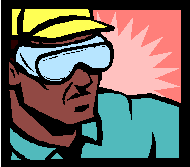It's always good to get out of Washington, particularly since my current day-job doesn't provide for as much contact with workers and union members as my old AFSCME job did.
COSH groups, for those who don't know, are local coalitions of workers (union and non-union), unions, public health advocates and environmentalists who provide training and advocacy on a variety of different workplace safety, workers comp and labor issues.
 In addition to traditional workplace safety issues, COSH groups have been particularly active in training for immigrant and young workers. The COSH National Network coordinates the activities of the different COSH groups. They're funded by local unions, individual members, some foundations, and OSHA grants. The COSH groups received a sizable OSHA grant during the Clinton administration to address immigrant workers concerns which has survived until the present, despite the Bush administration's incessent attempt to kill OSHA's entire worker training program.
In addition to traditional workplace safety issues, COSH groups have been particularly active in training for immigrant and young workers. The COSH National Network coordinates the activities of the different COSH groups. They're funded by local unions, individual members, some foundations, and OSHA grants. The COSH groups received a sizable OSHA grant during the Clinton administration to address immigrant workers concerns which has survived until the present, despite the Bush administration's incessent attempt to kill OSHA's entire worker training program.MassCOSH has active campaigns supporting immigrant and teen workers. The Teens Lead at Work Initiative uses a team of Youth Organizers to conduct workshops and other forums for peers to make them aware of their rights to a safe and healthy working environment and opportunities for advocacy and organizing to protect these rights.
One of the awardees at the MassCOSH banquet was Taciana Ribeiro Saab whose 16 year old son was killed in 2004 chasing a CVS shoplifter. She was become an activist and was awarded MassCOSH's Young Worker Justice Award. Other awardees were Byron de Leon who won the
Immigrant Worker Award of Courage, Lenore Azaroff winning the Health Tech Champion and Bill Allen who won the Buddy Adams award. Allen had recently been fired from city employment because he complained about the lack of confined space precautions. Massachusetts is one of 26 states without workplace safety protections for public employees. MassCOSH is also running a campaign to pass a bill that would provide public employee OSHA.
Next stop on the New England tour was Hartford for the Connecticosh annual meeting. The meeting was also attended by a large and spirited group of workplace safety activists. Connecticosh has also been around for over 20 years and has been active in
getting workers the right to know about chemical hazards, getting funding for worker education, establishing and supporting occupational health clinics, improving workers’ compensation, and fighting for issues such as getting rid of mandatory overtime, better health for migrant farmworkers, improved indoor air quality in schools, and reducing chemical exposures.Let 1000 COSH's Bloom
Although speaking at these functions and spending a little time talking with people was, as I said, energizing and inspiring, it was also a bit depressing. On paper, there are 23 COSH groups, most on the East and West Coast -- with Detroit, Chicago, Houston and Arkansas filling in the middle. Many, like Masscosh and NYCOSH have several full time staff, while others exist only on a few kitchen tables.
I often receive letters from family members of workers who were killed on the job, people like Taciana Ribeiro Saab. Almost universally they tell me they want to do something to make sure that the same thing doesn't happen to anyone else. They're angry, the feel frustrated and forgotten by OSHA, by the former employer, and often by the former union. In Boston, or Hartford or New York, or Houston there's someplace they can go, but in 33 states and dozens of metropolitan areas they're left with nothing. With the demise of the AFL-CIO's health and safety department and the downsizing of their staff, the low rate of unionization in this country, the vast majority of active workers, injured workers and families of the injured and dead have nowhere to turn.
The only things needed to form a COSH group are activists, organization and money, the latter being the most significant problem. But it can be done and many more COSH groups are needed.
If you're interested in starting a COSH group in your area, check out the National COSH's site on "Starting Your Own COSH Group."